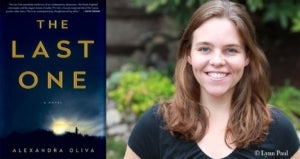
Alexandra Oliva–or Ali for short–has one of those Aspen Summer Words stories that we dream about. While attending our annual writing conference and literary festival in 2014, she met Lucy Carson from the Friedrich Agency, who went on to sell Ali’s novel at auction in a two-book deal to Penguin Random House. Ali, who lives in the Pacific Northwest with her husband and puppy, returned to Aspen last summer for a month-long writing residency where she put the finishing touches on her book and began working on the next one. Today marks the release of Ali’s debut novel The Last One, and the end (or beginning!) of Ali’s journey to becoming a published author. For any aspiring writer, Ali’s journey is an inspiring one. In this Q+A, she shares more about what she has learned through the process.
AW: You had two manuscripts—you’ve called them your “practice novels”—before The Last One. What do you think made this idea and this book the winner? What did you learn from writing those first manuscripts?
AO: I think the main reason this book was the one to get me through the door of traditional publishing is that my writing is exponentially stronger now than it was when I wrote either of my practice novels. It’s been a decade-long process of identifying and combating weaknesses in my writing and learning how to parse critical feedback—trying to find ways to improve instead of just raising my hackles every time someone said something I didn’t want to hear. I also gave myself much more liberty with voice while writing The Last One than I did with either of my practice novels. I’d always had it in my head that I could only write from a close-third-person perspective, but in The Last One I alternate between first person and omniscient third. Both perspectives were outside of my comfort zone, but I felt the structure of the novel called for them. Embracing these new-to-me narrative points of view was extraordinarily freeing in terms of voice.
I had also struggled with pacing in both of my practice novels (though it took me years to admit this), so with The Last One I tried to make sure things happened quickly and often. This book is half the length of my first practice novel, but probably contains twice the action. I think that’s a big part of its appeal.
AW: What has surprised you most about the publishing process?
AO: Learning that the bulk of the people who work in traditional publishing aren’t gate-keeping curmudgeons, but kind, hard-working individuals truly looking to fall in love with a book. This seems like an obvious truth to me now, but I used to be incredibly—absurdly—intimidated by anyone and everyone associated with publishing. Which is maybe natural when you spend so long on the outside looking in?
AW: In your Aspen Institute magazine piece, you wrote about facing a “stack of rejections” and shelving two manuscripts with 6-digit word counts. How did you stay motivated and committed to writing?
AO: It was difficult. Many people have commented on my “persistence,” and when they do I like to point out that when you’re in the middle of it, there’s no way to know if you’re being persistent or if you’re being stupid. For all I knew, I was throwing my life away on a gamble that would never pay off—a terrifying thought. That said, there were two main things that kept me going.
First, I could sense that I was getting better. Not only could I see my improvement on the page, but with each project I would get further into the process before getting rejected. For example, I think only one literary agent requested to read the full manuscript for Practice Novel 1. Submitting a similar number of queries for Practice Novel 2, that number was five—plus a bunch of requests for partials. The quality of my rejections likewise improved: They were more likely to be personalized than form letters. Those rejections were all still failures, but they were also small victories because they indicated a trend toward eventual success—or so I hoped.
Second, I didn’t know what else to do. My writing is the one thing that feels uniquely me; every time I seriously considered giving that up and committing myself to a “real job” I felt sick and panicky. I just couldn’t do it, not as long as I was still improving.
AW: What advice would you give to aspiring writers?
AO: Find a small group of fellow writers whose writing you like and whose feedback you respect—I found mine at an MFA program, but that’s not the only way. Commit to meeting regularly, submit work, discuss that work—yours and theirs. Be kind, but also honest. Learn how to parse critical feedback without taking offense. And when someone makes a suggestion that feels wrong to you, don’t immediately reject it. Examine it, look at the source of that suggestion and judge for yourself whether or not there is a problem there you need to fix. If there is, find a different solution that feels right to you.

